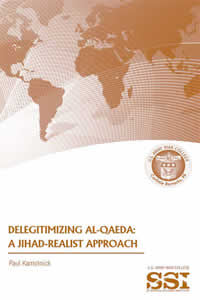Delegitimizing Al-Qaeda: A Jihad-Realist Approach

Authored by Dr. Paul Kamolnick.
March 2012
78 Pages
Brief Synopsis
Disrupting, dismantling, and ultimately defeating al-Qaeda based and inspired terrorism is a declared policy of the U.S. Government. Three key strategic objectives have been identified for accomplishing this: attacking al-Qaeda’s terror network, undermining radicalization and recruitment, and hardening homeland defense. The present monograph proposes a distinct "jihad-realist" approach for undermining radicalization and recruitment to al-Qaeda. First, a brief discussion of six means for ending terrorist organizations is provided. Second, the premises of a jihad-realist approach are described. Third, a jihad-realist shari’a case against al-Qaeda’s terrorism is presented. In conclusion, key assertions are summarized, and several specific policy recommendations offered for national security personnel charged with formulating and executing counterterrorist messaging strategy.
Summary
The 9/11 Commission Report identifies three strategic objectives—decapitation, deradicalization, and hardening homeland security—as key to disrupting, dismantling, and ultimately defeating the al-Qaeda terrorist enterprise. Though the first and third have been notably successful, the second objective has been relatively less so.
Approaches to counter-radicalization that rely on so-called “counterideological” or “counternarrative” approaches miss their mark: they presume ending al-Qaeda’s reign of terror requires that Islam as a religious faith delegitimize core Islamic and Islamist tenets, including key planks anchoring religious faith. They also fail to acknowledge and engage the breadth and depth of nonreligiously-motivated opposition to existing U.S. foreign and military policy, especially in the Middle East and the Israel-Palestine conflict. Finally, and most specifically, counternarrative approaches unnecessarily burden this strategic objective by casting a net far too wide and capturing in it a vast Islamic, Islamist, and salafist universe whose adherents are overwhelmingly morally repelled by al-Qaeda’s terroristic methods.
Islam is a law-governed religious faith that proscribes and prescribes human conduct. The jihad—the religious prescription to struggle and strive in the path/way of Allah until Allah’s word reigns supreme throughout the earth—including its military sense, is despite disavowal in popular piety and much modern moderate Islamic discourse, a binding religious prescription. This presumption of an enduring obligation to wage the military jihad is an essential starting-point in potentially delegitimizing al-Qaeda’s reign of terror among adherents for whom shari’a compliance is an essential requirement.
Recent important jurisprudential debates among jihad-realist Islamist militants have produced several conclusions that may be used to delegitimize al-Qaeda’s terror as both unlawful and imprudent. The majority of those conclusions arise from recent decades of “prison debates” in Muslim-majority societies over the legality, methods, means, and pragmatics of violent rebellion against their own governments.
These rulings are supplemented by others of vital relevance for undermining al-Qaeda terrorism directed principally against noncombatant civilians living in Muslim-minority societies. Among the latter, the most decisive legal rulings include the following: (1) murder is one of the gravest and forbidden of sins; (2) the impermissibility of targeting Muslims, and non-Muslim civilians, especially women, children, the elderly, scholars, and students of knowledge; (3) the impermissible extension of the principle of Tartarrus, or human shields; (4) the impermissibility of treachery, violation of oaths, and pacts of security granted (implicitly, or explicitly) to Muslims in non-Muslim majority societies; (5) jihad is impermissible unless specific capacities, conditions, and circumstances are present; (6) permissibility to wage offensive jihad must be granted by parents and creditors; (7) impermissibility of violating a voluntary oath of unconditional allegiance and obedience (bay’at) given to one’s recognized ruler; (8) the impermissibility of waging offensive jihad under present conditions of Muslim weakness vis-à-vis the infidel powers; (9) the permissibility of jihad, emigration, or a truce when facing infidel occupation; (10) the impermissibility of attacking American civilians of an occupying country in the name of jihad or under its banner; and, (11) the imprudence of al-Qaeda based and inspired terrorism.
It is suggested that relevant policymakers give due regard to the key role that jihad-realist jurisprudential debates hold for contributing to the tactical implosion and marginalization of al-Qaeda’s terrorism. Those charged with strategic communication, public diplomacy, and counterterrorist messaging should develop the motivation, capacity, and sophistication to systematically analyze how jihad-realism and a jurisprudence of jihad, may be leveraged for, and not against, vital U.S. national security interests.
Owing to present hostility directed in many quarters against U.S. policies in the Middle East and Muslim world generally, and the Israel-Palestine conflict in particular, however, it is extremely inadvisable for the United States to openly promote or publicize any of these initiatives. A key, indeed essential, ingredient for the authority of these findings is that they are viewed as absolutely untainted by any interest, factor, force, or power; rather, these debates rest on the legitimacy of the shari’a and involve credentialed actors of immense stature and learning.
It is advisable that the United States do everything within its power to make the case to the Muslim-majority countries, and the Muslim-minority populations in the Muslim diaspora, that as a country we are on the side of the lawful and the just, and we actively seek and promote solutions to long-simmering policy grievances. Our ability as a nation to openly associate with any efforts by internal Muslim actors must be deferred until the perception of our motivations is altered, and altered fundamentally. No amount of spin or messaging matters when daily life and its common-sense interpretation contradict official pretensions and pronouncements.
Access Full Report [PDF]: Delegitimizing Al-Qaeda: A Jihad-Realist Approach
|
NEWSLETTER
|
| Join the GlobalSecurity.org mailing list |
|
|
|

